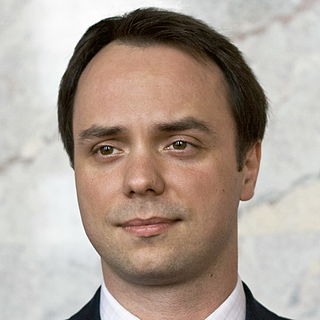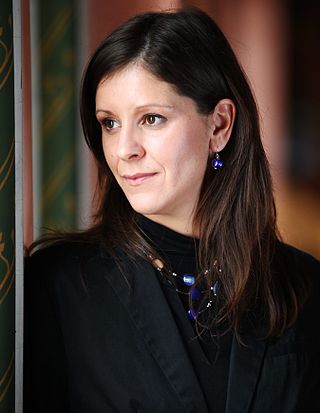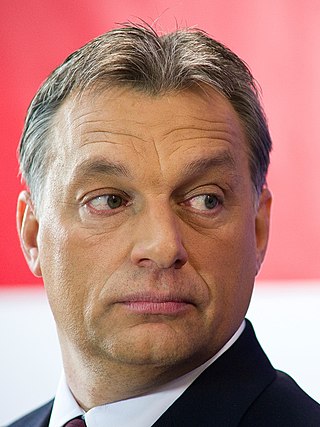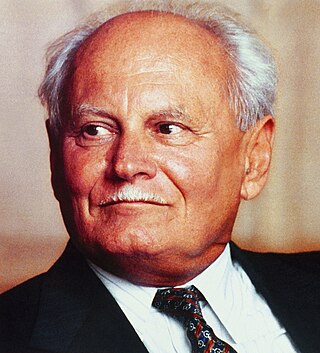
Péter Medgyessy is a retired Hungarian politician who served as Prime Minister of Hungary from 27 May 2002 to 29 September 2004. On 25 August 2004, he resigned over disputes with coalition partner Alliance of Free Democrats, but remained as acting prime minister for a 30-day period as required by the Constitution, and a few additional days until his successor Ferenc Gyurcsány was confirmed by the National Assembly.

The Hungarian Socialist Party, commonly known by its acronym MSZP, is a centre-left to left-wing social-democratic and pro-European political party in Hungary.

The Democratic Coalition is a social-liberal and social-democratic political party in Hungary led by former Prime Minister Ferenc Gyurcsány. Founded in 2010 as a faction within the Hungarian Socialist Party (MSZP), the Democratic Coalition split from the MSZP on 22 October 2011 and became a separate party. It has fifteen MPs in the National Assembly and four MEPs in the European Parliament.

Ferenc Gyurcsány is a Hungarian entrepreneur and politician who served as Prime Minister of Hungary from 2004 to 2009. Prior to that, he held the position of Minister of Youth Affairs and Sports between 2003 and 2004.

Parliamentary elections were held in Hungary on 9 April 2006, with a second round of voting in 110 of the 176 single-member constituencies on 23 April. The Hungarian Socialist Party (MSZP) emerged as the largest party in the National Assembly with 186 of the 386 seats, and continued the coalition government with the Alliance of Free Democrats (SZDSZ). It marked the first time a government had been re-elected since the end of Communist rule. To date, this is the most recent national election in Hungary not won by Fidesz-KDNP, and the last in which the victorious party did not win a two-thirds supermajority in parliament.

Parliamentary elections were held in Hungary on 7 April 2002, with a second round of voting in 131 of the 176 single member constituencies on 21 April. Although Fidesz remained the largest party in the National Assembly despite receiving fewer votes than the Hungarian Socialist Party, the Socialist Party was able to form a coalition government with the Alliance of Free Democrats.

Parliamentary elections were held in Hungary on 25 March 1990, with a second round of voting taking place in all but five single member constituencies on 8 April. They were the first completely free and competitive elections to be held in the country since 1945, and only the second completely free elections with universal suffrage in the country's history. The conservative, nationalist Hungarian Democratic Forum (MDF) beat the liberal and more internationalist Alliance of Free Democrats, which had spearheaded opposition to Communist rule in 1989, to become the largest party in parliament. The Hungarian Socialist Party, the former Communist party, suffered a crushing defeat, winning only 33 seats for fourth place.

Zsolt Nyitrai is a Hungarian politician and Member of Parliament (Fidesz) since 2002. He served as Secretary of State for Infocommunications in the Ministry of National Development between 2010 and 2011.

LMP – Hungary's Green Party is a green-liberal political party in Hungary. Founded in 2009, it was one of four parties to win seats in the National Assembly in the 2010 parliamentary election. It is a member of the European Green Party. The party's political position has been widely described as centrist and centre-left. Other sources describe LMP and their voters as "hard to evaluate", populist, and inclusive of centre-right elements.

Imre Mécs was a Hungarian politician. Following the Hungarian Revolution of 1956, he was sentenced to death, then his sentence was mitigated to a prison sentence. He was released in 1963 and worked as an electrical engineer. Later he became a founding member of the Alliance of Free Democrats (SZDSZ). He was elected on the SZDSZ party ticket to the Hungarian Parliament in 1990 and served several consecutive terms. Over differences with his party, he quit SZDSZ and was elected on the Hungarian Socialist Party (MSZP) ticket in 2006. He did not manage to win a seat in the 2010 elections, ending his parliamentary career. In January 2011 he rejoined his old party, SZDSZ.

The Social Union (SZU) was a centre-left political party in Hungary. It had a traditionalist and social democratic ideology.

Gergely Szilveszter Karácsony is a Hungarian politician, political scientist and current Mayor of Budapest. He previously served as member of the National Assembly (MP) from 2010 to 2014 and Mayor of Zugló from 2014 to 2019.

Zsolt Láng is a Hungarian politician and member of the National Assembly (MP) from 2010 to 2014 and since 2022. He served as the mayor of the 2nd district of Budapest from 2006 to 2019. He is a member of the right-wing Fidesz.

An early indirect presidential election was held in Hungary on 2 May 2012, following the resignation of Pál Schmitt as President of Hungary on 2 April 2012. János Áder was elected president with an absolute majority.

An election of Members of the European Parliament from Hungary to the European Parliament was held on 25 May 2014.

Dr. Bernadett Szél is a Hungarian economist and politician, and was a member of the National Assembly (MP) between 2012 and 2022. She was co-President of the Politics Can Be Different party from 2013 to 2018, and its candidate for the position of Prime Minister during the 2018 parliamentary election. Between 2018 and 2022 she became an independent parliamentarian. As of 2022 she works as esearcher and consultant. She is married and lives in Budakeszi with her husband and three children. Global climate protection and dedication to the green agenda, commitment to democracy and democratic Hungary, and equality of rights are consistently the main driving forces throughout her professional life.

Parliamentary elections were held in Hungary on 6 April 2014. This parliamentary election was the 7th since the 1990 first multi-party election. The result was a victory for the Fidesz–KDNP alliance, preserving its two-thirds majority, with Viktor Orbán remaining Prime Minister. It was the first election under the new Constitution of Hungary which came into force on 1 January 2012. The new electoral law also entered into force that day. For the first time since Hungary's transition to democracy, the election had a single round. The voters elected 199 MPs instead of the previous 386 lawmakers.

József Tóbiás is a Hungarian politician, who served as the leader of the Hungarian Socialist Party (MSZP) from 19 July 2014 to 25 June 2016. He was also a Member of Parliament from 1998 to 2019.

An indirect presidential election was held in Hungary on 13 March 2017. János Áder was elected President of Hungary for a second term.

The first indirect presidential election was held in Hungary on 3 August 1990, following the transition to multi-party democracy. Árpád Göncz (SZDSZ), Speaker of the National Assembly and acting head of state, was elected President with an absolute majority.






















